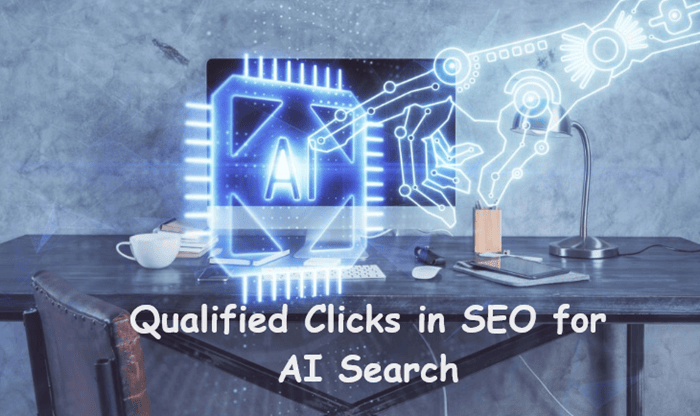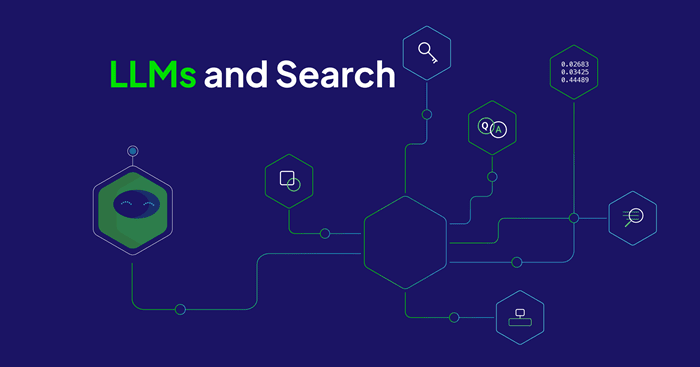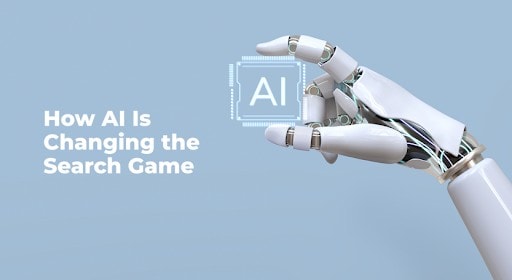With the emergence of AI search on the horizon, some anticipate the demise of traditional SEO and a decrease in web traffic. Understandably, this perspective raises concerns. However, there’s an alternative viewpoint on AI search that revolves around the notion of qualified clicks, offering a different outlook for websites.

Understanding AI Search
AI search refers to the use of artificial intelligence (AI) technologies and algorithms in the process of retrieving information from various sources on the internet.
Traditional search engines, like Google or Bing, rely on algorithms that match keywords to web content. In contrast, AI search engines leverage machine learning, natural language processing, and other AI techniques to understand user queries more intelligently and deliver more accurate and relevant results.
AI search engines aim to improve the search experience by understanding the context, intent, and nuances of user queries. They can consider factors such as user preferences, behavior, and the content of the web pages to provide more personalized and targeted results.
Additionally, AI search may involve features like voice recognition, conversational search, and predictive searching to enhance the overall search process.
The field of AI search is continually evolving, and advancements are being made to make search engines more intuitive and user-friendly. These improvements may include a better understanding of user intent, semantic search capabilities, and adapting to emerging technologies.
You can also read: Understanding the Importance of SEO in Today’s Digital Age
AI Search Is Different from Traditional Search
The landscape of search is evolving, and the advent of AI search might raise concerns about the source of search clicks. AI search, however, represents a change, and being different doesn’t necessarily imply a downgrade.
In a recent conversation with Fabrice Canel, an executive at Bing, the concept of “qualified clicks” was explored. While qualified clicks are commonly associated with PPC and affiliate marketing, they also hold significance in the AI search. Recognizing the context of qualified clicks in AI search is crucial for gaining insights into the future of SERPs and SEO.
A qualified click becomes clear when illustrated with an example of a qualified referral, wherein a website praises a product and provides a link for readers to make a purchase. In the given instance, the referral originates from a page that effectively promotes the product, guiding the reader on where to make the purchase.
Click. Then purchase. This click qualifies as a qualified click. Those engaged in affiliate marketing understand the effectiveness of contextual links like these in driving sales (conversions).
Links embedded in relevant contexts are invaluable because they yield higher conversion rates compared to, for instance, image advertisements. Such links align perfectly with the content of the website. And that’s precisely what AI search engines offer.
AI search engines don’t require a multitude of links because the responses are on point and the links are well-aligned. This precision is achieved through user interactions with AI search engines.
Fabrice Canel, the Bing executive recently interviewed by Jason Barnard, delved into this aspect.
Around the 3-minute mark of the video, Fabrice discusses how Bing Chat helps users pose intricate questions, including follow-ups, providing Bing with a clear and unequivocal contextual background about their precise needs.
This eliminates the need for guesswork regarding user intent and, consequently, the need to present ten links.
Ambiguity arises when traditional search engines rely on keywords. This led to the development of BERT, aiming to aid search engines in deciphering the meaning behind ambiguous search queries.
Yet, this ambiguity dissipates when users articulate long, complex questions in conversational language. Users autonomously refine their queries, expressing their needs naturally. The AI search engine comprehends these nuances and delivers the desired results.
In the context of AI chat-based search, ten links become unnecessary. However, the key point to grasp is this: The links displayed by AI search engines are exceptionally pertinent and well-qualified.
This is the concept Fabrice Canel is alluding to when he mentions qualified clicks.
Given that French is Fabrice’s primary language, his English carries an accent and incorporates some French grammar rules, contributing a distinctive quality to his responses. I’ve included my interpretation within brackets to enhance clarity.
You can also read: How To Use Generative AI Strategies To Improve SEO Results
He discusses the distinctive attributes of AI search queries and responses.
“So …example of a query:
I need to throw a dinner party for six people who are vegetarian. Can you suggest a three-course menu with a chocolate dessert?
And these are things that we are able to answer now.
…sometimes it’s all about understanding the web and providing this kind of experience where at the end we can — the clicks to the website having extremely qualified clicks.
And this is something we’ve seen where clearly when people are clicking, [these are] extremely qualified clicks. And this translates [into a] benefit for the end user, for the website more, certainly more than… typical search engine.”
Fabrice revisits the subject of qualified links around the 15-minute mark in the video below:
“And you see people absolutely delighted by this experience, generating more qualified clicks… This is clearly to be able to really understand deeply the web, [and] to really link to the perfect results on the web.”
I would like to pause and emphasize the point where Fabrice highlights how Bing AI search can connect to “perfect results on the web.” This is crucial because it clarifies why AI search engines don’t require ten links—they are already directing users to webpages that precisely address their queries, described as “the perfect results,” as he puts it.
Furthermore, he reiterates later how these links and the resulting clicks boast superior quality. Consequently, SEOs should prioritize enhancing the chat experience.
Fabrice explains:
“But this is for the SEO community. I see way too many focus still on the SERPs and not enough focus on the chat experience and conversation experience where we see really stellar clicks. In terms of what we are offering to the user, it’s the ability to have these kinds of perfect clicks.
And here in [Bing] Chat there is this whole experience and all this chat experience where we are able to land really the perfect clicks.
And so this is more qualified clicks.
…I encourage everybody in the SEO community to pay attention to this because these clicks are stellar, good quality clicks.”
Understanding qualified clicks provides a broader understanding of the significance of AI search.
The key point to grasp is that AI search diverges from the traditional ten blue links, and being different doesn’t equate to being inferior.
You can also read: Google on Performance Max results and SGE
AI search responses don’t present ten links because they offer users precise and contextual links—eliminating the need for the “people also ask” approach, as the AI search engine comprehensively understands user queries and what people are seeking. This results in the perfect click, the qualified click.
Understanding the concept of qualified clicks provides a perspective on AI search, facilitating a better approach to improving rankings for the AI chat experience.
Despite AI Search SERPs featuring only five or six links in the answers, each link is highly targeted, enhancing user experiences as they transition from the AI search engine to the website.
So, the next time someone predicts doom for SEO and website traffic due to AI search, refer them to this article and explain the significance of qualified clicks.
You can watch the interview with Fabrice Canel of Bing:
How Does Generative AI in Search Work and What is Coming in 2024?
Would you like to read more about “Understanding the Concept of Qualified Clicks in SEO for AI Search” related articles? If so, we invite you to take a look at our other tech topics before you leave!
Use our Internet marketing service to help you rank on the first page of SERP.
![]()












